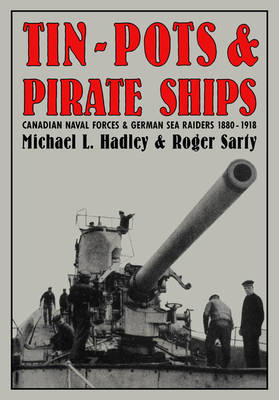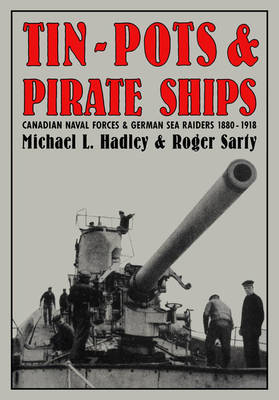
- Afhalen na 1 uur in een winkel met voorraad
- Gratis thuislevering in België vanaf € 30
- Ruim aanbod met 7 miljoen producten
- Afhalen na 1 uur in een winkel met voorraad
- Gratis thuislevering in België vanaf € 30
- Ruim aanbod met 7 miljoen producten
Zoeken
Tin-Pots and Pirate Ships
Canadian Naval Forces and German Sea Raiders 1880-1918
Michael L Hadley, Roger Sarty
Hardcover | Engels
€ 177,45
+ 354 punten
Omschrijving
Michael Hadley and Roger Sarty shed new light on Canadian and German history -- and on Canada's naval defences in particular -- by exploring the naval operations and politics of both nations between 1880 and 1918. Beginning with Canada's feeling of Splendid Isolation and Germany's imperial ambitions against North America, the authors' intriguing and graphic account takes us from the early turmoil of federal politics in Canada to the conflict of the Great War and the eventual mothballing of the Canadian fleet. Having conducted an exhaustive study of Canadian, German, American, and British sources -- many of which have not been examined before -- Hadley and Sarty evaluate such major issues as policies and practice; intelligence schemes and spy scares; naval bills and the Dreadnought crisis; U-boats, commercial submarines, undersea cruisers, and surface raiders; and coastal patrols and convoy protection. Many factors that were believed to have been responsible for shaping -- and misshaping -- the Canadian Navy of 1939-45 are shown to have been in play during the First World War. Tin-Pots and Pirate Ships reveals the Canadian tradition of building a fleet only when needed, dismantling it once the conflict is over, and ultimately accepting terms dictated by alliance partners.
Specificaties
Betrokkenen
- Auteur(s):
- Uitgeverij:
Inhoud
- Aantal bladzijden:
- 424
- Taal:
- Engels
Eigenschappen
- Productcode (EAN):
- 9780773507784
- Verschijningsdatum:
- 1/01/1991
- Uitvoering:
- Hardcover
- Formaat:
- Genaaid
- Afmetingen:
- 178 mm x 254 mm
- Gewicht:
- 939 g

Alleen bij Standaard Boekhandel
+ 354 punten op je klantenkaart van Standaard Boekhandel
Beoordelingen
We publiceren alleen reviews die voldoen aan de voorwaarden voor reviews. Bekijk onze voorwaarden voor reviews.











